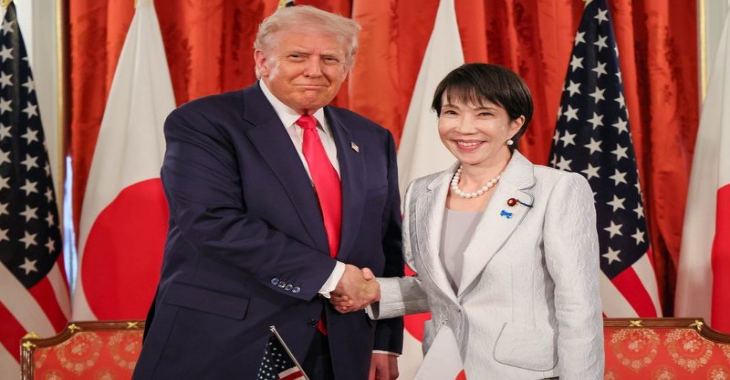Despite the crucial minerals and rare earths deal that Japan and the US signed in Tokyo on Tuesday, experts in Washington thought that Tokyo was concerned that the US President might “soften his stance on China” when he meets with his Chinese counterpart Xi Jinping later this week in South Korea.
Sayuri Romei, a Senior Fellow at the German Marshall Fund (GMF), stated that “Tokyo’s main fear is that Trump may just soften his stance on China and will strike a deal with Beijing that could impact the regional balance” during a Tuesday media appearance in Washington.
On Monday, Trump met with Sanae Takaichi, the incoming prime minister of Japan, in Tokyo and signed a number of agreements, including one on rare earths and vital minerals.
In order to speed up the security of mineral supply chains, both parties pledged to step up their “cooperative efforts.”
“The Participants are intensifying their cooperative efforts to accelerate the secure supply of critical minerals and rare earths necessary to support domestic industries, including advanced technologies and their respective industrial bases, by leveraging policy tools such as the United States’ and Japan’s financial support mechanisms, trade measures where appropriate, and critical minerals stockpiling systems,” according to a statement released by the White House.
Additionally, it stated that both nations will step up their efforts to encourage communication between upstream and downstream businesses in order to support supply chain diversity.
The US-Japan minerals agreement was praised by the House Select Committee on China on Tuesday. “The new US-Japan trade and critical minerals agreements strengthen our shared supply chains and deter China’s economic coercion,” the post stated on X. The best defense against the CCP’s aspirations to control important businesses and technologies is a strong alliance.
Romei did, however, add that Tokyo is still concerned about the uncertainty surrounding the US President, regardless of the agreements.
“Trump always seems to pay attention to the final person who speaks to him. Thus, after hearing Tokyo’s point of view, it will be interesting to observe how he approaches his meeting with Xi Jinping in this instance, she said.
The US signed mineral agreements with Thailand, Cambodia, and Malaysia two days prior to the pact with Japan.
Following China’s announcement in early October of extensive export restrictions on rare earths and related technology, US attempts to de-risk vital minerals supply chains have accelerated.
In opposition to the action, the Trump administration vowed to impose 100% tariffs on Chinese goods while working to form an international alliance, especially with India, to resist China’s threats.
A “framework” for a trade agreement was reached last week when US Trade Representative Jamieson Greer and Treasury Secretary Scott Bessent met with China’s Vice Premier He Lifeng and trade negotiator Li Chenggang in Malaysia.
In an interview with ABC News on Sunday, Bessent asserted that Beijing has consented to a one-year “delay” in rare earth export regulations.
The Managing Director of the GMF’s Indo-Pacific Program, Bonnie Glaser, emphasized that the Chinese think their dominance in the rare earths industry gives them an advantage in the negotiations.
“I think the Chinese think Trump is willing to compromise and will give in in certain ways.”
She continued by saying that Trump acknowledges that China has “weaponized” its rare earths and that the US is uneasy about recent accords with Southeast Asian nations.
“Some of those agreements contain provisions where countries have essentially pledged to not do things that would be harmful to the United States, in other words, to not stand with China,” she continued.
Despite the possibility of agreements on rare earths and other topics, Glaser claimed that the summit will not “fundamentally alter the dynamics in the US-China relationship.”
“I anticipate that the intense competition between the United States and China will continue in many areas and domains, such as which country will shape and lead the international order, which country has the upper hand in innovation and technology diffusion, and which political and economic system is superior,” she said.
Read More
India praises Trump’s contribution to the peace agreement in Gaza
‘Pretty heavy’ US sanctions against Russia: White House


